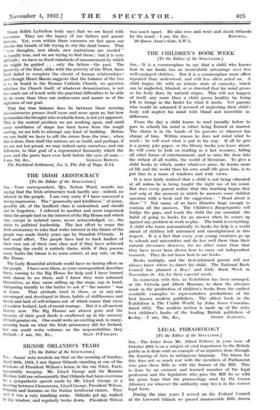THE IRISH ARISTOCRACY
[To the Editor of the SPECTATOR.] SIR,—Your correspondent, Mrs. Nelson Ward, resents my saying that the Irish aristocracy took hardly any—indeed, no interest in the people. I am very sorry if I have' conveyed a wrong impression. The " generosity and kindliness" of many, possibly all, of the landlord class is undoubted, and should not be forgotten. I referred to another and more important claim the people had on the interest of the Big House and which was, except in isolated cases, never acknowledged, i.e., the claim to political leadership. The last effort to rouse the Irish aristocracy to take that wider interest in the future of the people was made thirty years ago by Standish O'Grady. It had small effect. The people have had to hack leaders of their own out of their own class and if they have achieved something the credit is entirely theirs, while if they possess many faults the blame is to some extent, at any rate, on the Big House.
The Lady Bountiful attitude could have no lasting effect on the people. I have seen them, as your correspondent describes them, coming to the Big House for help and I have burned with shame to see them, and I know they were ashamed themselves, as they came sidling up the steps, cap in hand, whispering timidly to the butler to ask if "the master" was at home. That attitude bred in them, or at any rate encouraged and developed in them, habits of shiftlessness and deceit and lack of self-reliance out of which comes that curse of modern Ireland, lack of moral courage. But it is all ancient history now. The Big Houses are almost gone and the memory of their good deeds is swallowed up in the memory of their greater sin. One could write an exciting and, to many, amazing book on what the Irish aristocracy did for Ireland, but one could write volumes on the responsibilities they










































 Previous page
Previous page